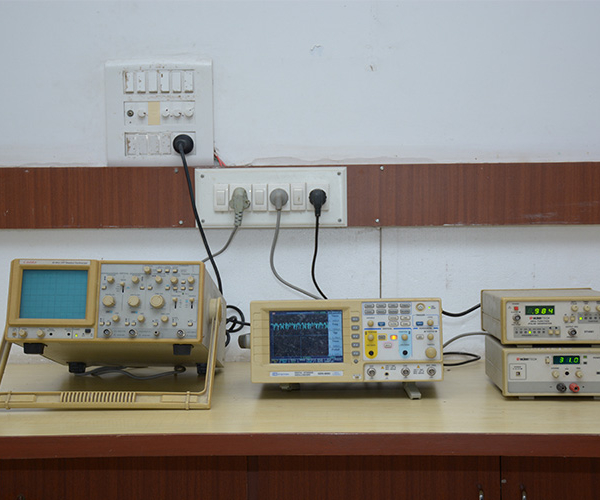Electronics and Communication
Home / GIT / Program / Electronics and Communication
About Department
The Department offers B. Tech in Electronics and Communication Engineering. It is a four-year programme with an intake of 30. The curriculum is a blend of fundamental and advance level courses which are in synchronisation with the latest trends in the field of electronics and communication engineering. The alumni of the Department had secured numerous milestones in their career. The Department boasts of a well-established state-of-the-art lab for Antenna and Wave Propagation, Satellite Communication, Digital Electronics, Analog Electronics and also has a Licensed copy of MATLAB Software. A wide range of choices are offered to students through department and institute electives, and courses including Universal Human Values and Indian Constitution.
Courses Offered:
- B, Tech. E&C (30)
Vision
To provide a platform to the students of Electronics and Communication wherein they can develop a skillset which will help them achieve their ambition and goals in life.


Mission
To develop future engineers with a strong foundation of electronics, communication and its allied subjects. The department aspires to make students job ready and stay relevant for changes in future technologies.
About Course
- Electronics and Communication Engineering is one of the fastest growing fields in engineering. EC engineers engage in research, designing, developing and testing of electronic equipment used in various systems. The branch covers a wide area of applications from small sensors to huge satellites, simple calculators to fast computers, microwave ovens to missiles, mobile phones to medical electronics, automation in industries to electronics in automobiles etc.
- The employment in EC sector has amplified significantly over the last few years due to our increased dependence on smartphones, tablets, processors, smart watches and LED TVs. There will be a surge of around 7 Lakh Jobs in the Telecom Sector in the next 5 Years. Under the Digital India campaign, the Indian government is going to invest around 1000 crores USD in IC chip manufacturing.


PEOs
- PEO1: To enable our graduates to grasp the fundamentals of Electronics and Communication Engineering very conceptually so that they can continuously update themselves with the growing technology.
- PEO2: To prepare competent professionals for industry and academia with capabilities to solve inter-disciplinary and complex real-time problems.
- PEO3: To prepare graduates with capabilities to meet the challenges required to handle the issues of upcoming technologies in the field of sensor networks, IoT, image processing, wireless communication and consumer electronics.
- PEO4: To prepare graduates with effective communication skills, professional ethics and an aptitude for contributing to societal needs.
PSOs
- PSO1: To enable our graduates to apply science, engineering and mathematics fundamentals through differential and integral calculus in order to solve complex electronics and communication engineering problems.
- PSO2: To enable our graduates to demonstrate proficiency in use of software and hardware required to practice Electronics and Communication as a profession.
- PSO3: To enable our graduates to identify complex engineering problems and develop solutions in the area of Analog & Digital Electronics, Communication, Signal Processing, VLSI, Embedded Systems, Automation, Robotics, Image Processing, Coding, IoT and other allied subjects.

Program Outcomes (PO):
Graduates from Electronics and Communication Engineering Department will be able to:
- PO1: Understand and apply the fundamentals of physics, mathematics, electronics and communication fundamentals to solve complex problems.
- PO2: Identify, analyze and solve complex electronics and communication problems.
- PO3: Give solutions to complex electronic and communication problems and design electronic systems and processes to meet the cultural, societal and environmental needs.
- PO4: Use research-based knowledge of electronics and communication to interpret and synthesize data for providing meaningful conclusions.
- PO5: Adapt professional ethics, responsibilities and norms of the electronics and communication engineering practice.
- PO6: Able to function effectively as an individual, member or leader of a diverse team and in a multidisciplinary setting.
- PO7: Able to communicate effectively on different engineering activities pertaining to electronics and communication with the engineering community at large. Should be able to comprehend and write effective reports and design documentation, make effective presentations.
- PO8: To develop self-confidence and managerial skills for the utilization of engineering knowledge for sustainability.
What Students Learn in Electronics and Communication?
- Basic Electronics
- Circuits and Networks
- Digital Electronics
- Electronic Devices and Circuits
- Microprocessor and Interfacing
- Analog Circuit Design
- Electronics Measurement and Instrumentation
- Control System Engineering
- Signals and Systems
- Microcontroller and Interfacing
- Engineering Electromagnetics
- Audio Video Systems
- Digital Communication
- Antenna and Wave Propagation
- Optical Communication
- VLSI Technology and Design
- Telecommunication Switching Systems and Networks
- Microwave Engineering
- Digital Signal Processing
- Wireless Communication
- Satellite Communication
- Data Communication and Networking
- Radar & Navigational Aids




























